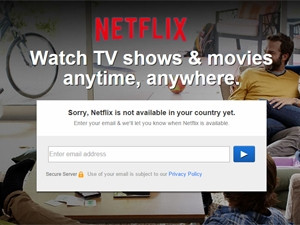
While South African consumers may be eagerly awaiting the official arrival of on-demand over-the-top (OTT) video service Netflix, SA's telecoms operators are likely to be less enthusiastic.
It will also mean the country's telecoms regulator will be presented with the challenge of weighing up net neutrality with fair data traffic management.
The US-based video-on-demand (VOD) provider has been rumoured to be in talks with local operators around bringing its services to SA, although nothing has been confirmed. In the meantime, "back door" online services like UnoTelly are allowing local Internet users to access the service, as well as others yet to reach our shores, like Amazon and Hulu.
There has been a lot of noise around mobile and Internet operators' animosity towards OTT players in general, with some being of the sentiment that the disruptive players are getting a "free ride" on the networks telcos have invested time and money building.
Last week, Denmark-based Strand Consult released a particularly biting research note deriding the behaviour of Netflix, following the latter's third quarter financial letter to shareholders. Strand accuses Netflix of underhandedly shaking down the telco and content industries, using public relations stunts, a "bogus" speed index and manipulating regulators.
"We find it interesting that the company that so maligns broadband providers has managed to build a successful, profitable and growing business on top of their networks," says Strand Consult - which has in the past indicated its support of net neutrality.
Road rules
ICT expert Adrian Schofield says, while Netflix apparently wants to manipulate the network environment to ensure it dominates the market, its ability to shake down telcos and content providers depends on their willingness to be victims.
MultiChoice COO Mark Rayner recently said the company, which has its own subscriber VOD service, is constantly watching for what international players are up to, as the company knows SA can anticipate their local arrival. "We know they will be here. It is not a case of if, it is a case of when."
Schofield compares net neutrality to road neutrality, saying different types of traffic must be able to share the highway, governed by a set of rules that enables all users to reach their destinations in an acceptable time frame. "The rules must protect the interests of the majority and ensure that traffic is not brought to a halt or restricted by the actions of a minority," he notes.
"So, we cannot allow farm tractors to drive six abreast at 20km an hour, nor can we clear the highway to allow McLaren F1 cars to streak though at 300km per hour (or blue light brigades to push other users off the road)."
Strand Consult's censorious research note states: "While Silicon Valley may celebrate its disruptive OTT business models, the EU is struggling to deliver social services its citizens expect; namely, through taxation."
Schofield adds disruptive technologies do just that - they disrupt. The telcos have created high-speed networks, and content providers are taking advantage of the opportunity, he says, questioning: "Is there a right and a wrong about how that is done, how it is managed?"
If the stakeholders do not behave responsibly - or if certain classes of users are prejudiced - then there is a case for regulators to step in and protect the vulnerable, he says.
"In an already regulated environment, we have to be careful to avoid the heavyweights taking advantage of loopholes while claiming innocence. If I was the regulator, I would want to keep the racing cars and the tractors off my highways, but I would not object to someone building special tracks to accommodate them."
Netflix had not responded to a request for comment by the time of publication.
Share